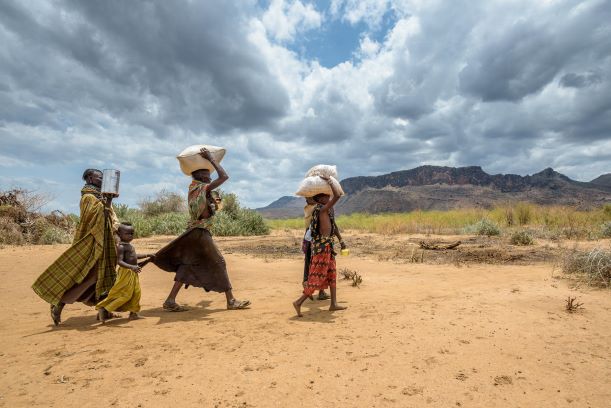
A record 45 million people across 16 countries in Southern Africa will suffer food shortages in the next six months, according to a sobering analysis of the hunger crisis across the region.
And the young face the greatest risk, with children in Angola forced to subsist on just one meal a day, according to agencies working in the region.
The climate emergency and rapidly repeating drought cycles are trapping people in a vicious cycle of poverty, World Vision Australia CEO, Claire Rogers, said today.
"World Vision staff are seeing devastating effects from changing weather patterns in the communities we work with," Ms Rogers said. "When food is short, children suffer. In Angola, children are barely eating one meal a day. Many children have been separated from families, forced out of school, and are working for their next meal."
Southern Africa's drought has sparked critical food, nutrition and water insecurity. The number of people experiencing "crisis" or "emergency" levels of food insecurity has risen from nine to 11 million across nine countries in Southern Africa.
"About half of those affected are children, who are at risk of hunger, disease, exploitation and death," Ms Rogers said.
Angola and Zimbabwe have experienced recurrent drought in recent years, causing failed harvests, while in Mozambique, erratic floods and cyclones have damaged or destroyed 700,000 hectares of crops.
The crisis is having widespread social consequences, including declining school attendance in Zimbabwe and Angola, where the drought is ravaging families' livelihoods and, therefore, their ability to pay fees.
"World Vision is seeing a lot of young children dropping out of school in the communities it works in, particularly in rural areas where children are needed to fetch water, work for money or help with the cattle," Ms Rogers said.
The organisation is concerned this exposes children to danger.
Climate change is now factored into World Vision's development programs, according to World Vision Southern Africa Hunger Emergency Response Director, Maxwell Sibhensana.
"We have to anticipate the worst and help farmers become more resilient to climate shocks, as the Intergovernmental Panel on Climate Change predicts many Southern African countries will be among the most affected by climate change," Mr Sibhensana said.
- In Angola, more than 2.4 million people are affected, with an estimated 85,000 children experiencing acute malnutrition. World Vision data shows malnutrition levels in Huila province have doubled compared to last year, currently at more than 20 per cent
- In Zimbabwe, 5.5 million people are facing hunger, with one in three people in major cities like Harare needing humanitarian assistance. The cost of basic commodities has tripled as the country faces inflation and an economic crisis. The country's staple crop, maize, is reported to run out in January
- In Zambia, more than 2.3 million people are estimated to be facing acute hunger due to devastating effects of erratic rains, dry spells, water logging, false and late starts to the 2018/2019 rain season on agriculture production
World Vision is responding to the hunger emergency across seven countries – Angola, Zambia, Zimbabwe, Eswatini, Lesotho, Malawi and Mozambique. World Vision is appealing for $63 million to address urgent humanitarian needs including child protection, urgent treatment of malnutrition, prevention of diseases, food assistance and water and sanitation interventions.






